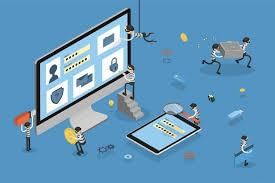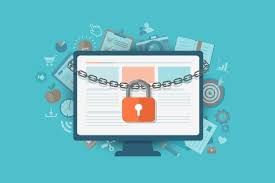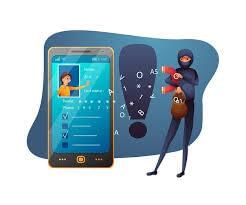Your online safety | Year 6 Computing PDF Download
Our online world
- The internet and its various tools have expanded and improved our world.
- We can connect and communicate with friends and family worldwide and explore a vast digital library of information, entertainment, and games.
- We access this online world through fantastic digital devices like computers, laptops, smart TVs, mobile phones, smartwatches, fitness trackers, game consoles, and VR headsets.
- This list of devices is continually expanding.
- During our online activities, we will interact with people, including family, friends, and strangers.
- We will create online accounts and profiles that request personal details and information.
- It's crucial to know how to stay safe in the online world and how to seek help when needed.

Protecting Your Online Identity
- Never share personal information online with people you don't know well in real life, including friends of friends and complete strangers.
- Be cautious when sharing photos; avoid including details like your school's name, which might appear on your PE kit or uniform.
- When sharing photos near your home, ensure no street signs are visible to protect your location.
- Make sure others can't see your location details, as this can be very unsafe.
- Check your account privacy settings to ensure your profile details and location information are not public.

Know who you're dealing with
- It's best to only play games or chat with people you know in person.
- Treat online acquaintances the same way you would strangers in the real world: be polite, but never share or ask for personal information.
- If someone online makes you feel unsure or uncomfortable, stop contact immediately and tell a trusted adult.
- Remember that people you meet online may not be who they say they are, so never arrange to meet them in real life.
Setting Up Online Accounts
When you set up online accounts, follow these important tips:
- Always consult with a trusted adult before creating any online accounts.
- Create a unique nickname instead of using your real name as a username to protect your personal information.
- Avoid using a real selfie as your profile image. Opt for a fun and safe option like an avatar or cartoon version of yourself.
Keeping details safe and secure
In today's digital age, it is crucial to protect our online information just like we safeguard our physical belongings in the real world.
Let's explore how we can keep our valuable digital assets safe and secure:
- Be Mindful of Leaving Items Unattended: Just as we wouldn't leave our wallet or keys lying around in public, we should avoid leaving our devices unattended, especially in places where others can access them.
- Secure Access Points: Similar to locking doors and windows in our homes for security, we must secure our digital access points with strong passwords, passcodes, or biometric authentication.
- Protect Valuables: When carrying physical valuables like keys or money, we ensure they are safely stored in a pocket or bag. Likewise, we should secure our digital valuables by using secure storage methods like encrypted folders or password managers.
It is essential to apply these strategies to safeguard our online information and possessions from unauthorized access or misuse.
Imagine someone gaining access to your favorite online game account and deleting all your progress or sending malicious messages to your contacts. By prioritizing digital security, we can prevent such scenarios and safeguard our online presence effectively.

Creating and Managing Strong Passwords
When it comes to online security, creating and managing strong passwords is crucial to protect your accounts from unauthorized access. Here are some key points to keep in mind:
- Avoid predictable passwords: Refrain from using easily guessable information such as your name, birthday, or common words like 'password'.
- Complexity is key: Craft passwords that include a mix of uppercase letters, lowercase letters, numbers, and symbols to enhance security.
- Length matters: Opt for longer passwords as they are generally more secure. Aim for a combination that is unique and not easily guessable.
- Unique passwords: Use a different password for each user account to prevent a security breach on multiple fronts.
- Avoid password sharing: Refrain from sharing your passwords with others, even friends or family members.
- Deny password saving: Resist the urge to save passwords on websites unless you are using a personal device that only you have access to.
- Always log out: Ensure that you log out of websites and online sessions completely to prevent unauthorized access.
What is hacking and identity theft?
- Breaking into an online account without permission is called hacking.
- Hackers might steal personal information and use it to pretend to be the account user, known as identity theft.
- Getting hacked can be upsetting and frustrating, and it's a concern for both individuals and businesses.
- Signs that you might have been hacked include:
- Receiving lots of pop-ups from companies offering things you haven't asked for.
- Your device suddenly slowing down.
- Friends and family asking why you have sent them strange messages or website links.
- If you think your account has been hacked, tell a trusted adult and show them what you've noticed.
- Let your friends know what has happened, so they can protect themselves from being hacked too.

|
19 videos|26 docs|3 tests
|
FAQs on Your online safety - Year 6 Computing
| 1. What are some important online safety guidelines to follow? |  |
| 2. Why is it important to understand digital communication systems for online safety? |  |
| 3. How can UK schools help promote online safety among students? |  |
| 4. What are some common risks associated with digital communication systems? |  |
| 5. How can individuals protect themselves from online threats while using digital communication systems? |  |















